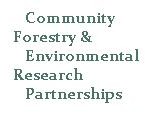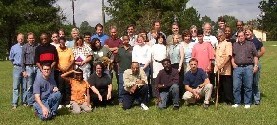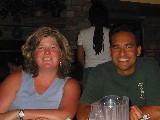|
Alumni & Faculty News
Summer 2006
Jan Lowrey
1949-2006
Jan Lowrey, executive director of the Cache Creek Conservancy, died unexpectedly of a heart attack in January. Jan was our gracious host on the field trip to the Cache Creek Nature Preserve during the CFERP Workshop in California last year.
Jan started as a member of the Cache Creek governing board before being hired as a program director in the mid-1990s. He became the executive director in 1999. Jan made it possible for the Preserve to host the research projects of both Don Hankins (CFERP ‘04) and Shannon Brawley (CFERP ’02-03). Happily, he lived to see Don get his PhD and he congratulated Shannon on passing her orals just before he passed away. His presence in our extended community will be greatly missed.
Eastern Oregon Community Working Group Receives National Award
Eva Harris, a CFERP community partner in 2000, is a founding member of the Little Canyon Mountain Working Group that recently received the BLM “Excellence in Wildland-Urban Interface Program Award.”
In 2002, concerned citizens in Grant County, Oregon, approached the Prineville District of the BLM, requesting that action be taken to reduce the significant threat of wildfire danger to their homes and to the towns of John Day and Canyon City. Numerous private residences are located directly next to 2,200 acres of BLM land (Little Canyon Mountain) that have a high ratio of diseased and dying trees.
In response, a working group was formed that included staff of the city of John Day, an elected official from Mt. Vernon, private citizens and business owners representing a wide spectrum of interests and beliefs. Short and long-term solutions to the hazardous fuels situation were identified and throughout this multi-year project local landowners were actively involved in working with the Oregon Department of Forestry to create defensible space on their private property, assisted by funding from National Fire Plan grants.
“We applaud Canyon City and John Day citizens for their initiative and drive; they are the genuine recipients of this award. They recognized a dangerous situation surrounding their towns and took an active role to work with the BLM in resolving the problem. Their proactive approach is a model for other interface communities that are significantly threatened by the danger of wildland fire,” said Christina Welch, Central Oregon Resource Area Manager.
The Acequia Institute
Devon G. Peña, Ph.D., Professor of Anthropology at the University of Washington, and past faculty advisor for Vanessa Mazel, CFERP fellow ‘05, and Sue Johnston, CFERP fellow ‘02, announces the launch of The Acequia Institute.
The Acequia Institute, Instituto de la Acequia, is a private non-profit organization dedicated to collaborative research and education for environmental sustainability and social justice in acequia farming communities of the Upper Rio Grande bioregion. The Institute exists to protect and promote the acequia institution as one of the oldest forms of local democratic self-government and to nurture traditional forms of regenerative agriculture.
The institute is a grant-making organization and in the next year hopes to establish a graduate fellowship program for students conducting anthropological, historical, or legal research on Chicana/o land grant and/or acequia institutions and communities.
For more information: www.acequiainstitute.org
|







